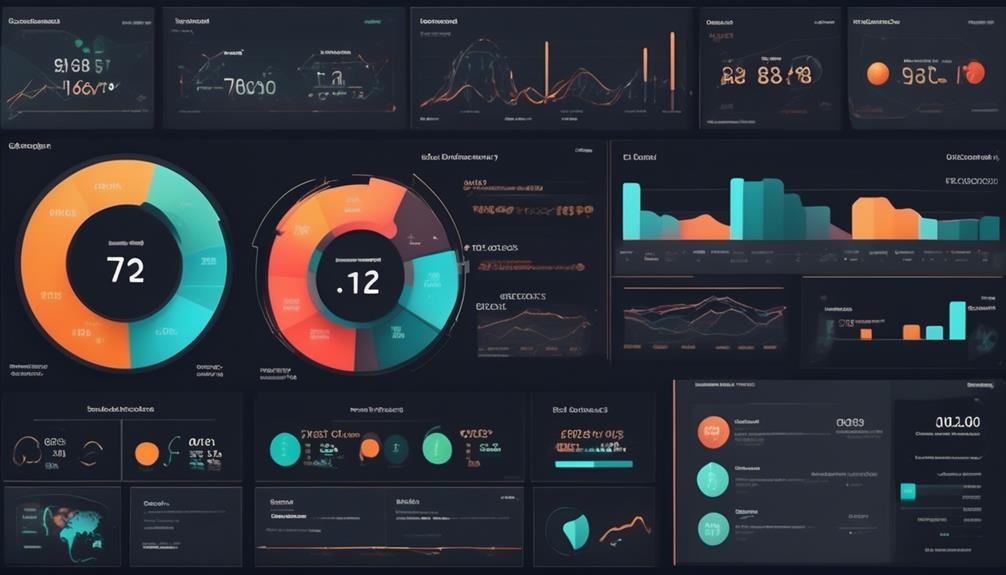If you are heavily involved in software quality assurance (SQA), you may not be aware of how rapidly the more complex topics in this field are progressing.
From AI-driven testing to blockchain testing and the complexities of IoT environments, the challenges and opportunities in SQA continue to expand.
In this discussion, we'll explore some of the most cutting-edge advancements and strategies that are shaping the future of SQA for professionals.
These topics are not just theoretical; they have practical implications for how we approach and ensure the quality of software in an increasingly complex technological landscape.
Key Takeaways
- AI-Driven Testing and Blockchain Testing are revolutionizing SQA by improving efficiency, security, and validation processes.
- Performance Engineering and Load Testing are essential for optimal application functioning and the ability to handle increasing workloads.
- Evolving Security Testing methodologies and tools, along with Ethical AI Testing, are crucial for ensuring responsible and secure development and use of software systems.
- DevOps Collaboration and Continuous Integration play a vital role in enhancing software delivery efficiency, system performance, and data-driven decision-making.
AI-Driven Testing
AI-Driven Testing optimizes testing processes by leveraging machine learning and automation, revolutionizing the field of software quality assurance. The integration of machine learning algorithms in AI-driven testing enables the analysis of vast amounts of testing data, leading to the optimization of test cases. This results in a more efficient and accurate testing process.
SQA specialists benefit from AI-driven testing as they can now direct their focus towards critical areas with higher accuracy and productivity. This intelligent automation not only improves the testing process but also allows for the identification of potential issues that might've been overlooked in traditional testing methods.
The revolutionary impact of AI-driven testing extends beyond the realm of SQA, permeating various industries and creating smarter testing processes. The potential for more accurate and efficient testing through intelligent automation sets a new benchmark for software quality assurance.
Embracing AI-driven testing is crucial for staying competitive in the rapidly evolving landscape of software development and quality assurance.
Blockchain Testing

Blockchain testing involves critical aspects such as security and smart contract validation.
As SQA specialists, we must ensure the integrity and reliability of blockchain-powered systems.
This requires comprehensive testing to verify the security of decentralized applications and their potential impact on sectors like supply chain management and finance.
Security in Blockchain Testing
In ensuring the security and reliability of blockchain-powered systems, SQA specialists play a pivotal role through comprehensive testing. Security testing in blockchain is crucial due to the decentralized and immutable nature of the technology. Here's a comparison of traditional security testing versus security testing in blockchain:
| Traditional Security Testing | Security Testing in Blockchain |
|---|---|
| Focuses on centralized systems | Focuses on decentralized systems |
| Vulnerabilities mainly in network and application layers | Vulnerabilities include consensus algorithms and smart contracts |
| Emphasis on data confidentiality and access control | Emphasis on validating transactions and protecting digital assets |
| Relies on firewalls and encryption | Relies on cryptographic techniques and consensus protocols |
SQA professionals must adapt their security testing approaches to address the unique challenges posed by blockchain technology, ensuring the integrity and reliability of decentralized applications.
Smart Contract Validation
Security testing in blockchain, particularly in the context of smart contract validation, requires a shift in focus from traditional centralized systems to the unique decentralized nature of blockchain technology. When considering smart contract validation, the following testing strategies are crucial for ensuring the integrity and security of decentralized systems:
- Rigorous functional testing to validate the behavior of smart contracts under various conditions
- In-depth security testing to identify and mitigate vulnerabilities
- Compliance testing to ensure adherence to business rules and regulatory requirements
- Continuous monitoring and auditing of smart contracts to maintain their reliability and trustworthiness
Smart contract validation is an essential aspect of blockchain testing, and employing comprehensive testing strategies is paramount in upholding the stability and security of decentralized applications and transactions.
IoT and SQA
Testing IoT devices presents unique challenges for SQA specialists. It requires a thorough understanding of individual device functionality and communication in complex ecosystems.
As SQA professionals, we develop strategies for seamless integration and robust performance in IoT environments. Our goal is to ensure reliability and functionality across the interconnected IoT landscape.
The effectiveness and security of interconnected devices depend on comprehensive testing processes in the IoT and SQA domain.
IoT Testing Challenges
Navigating the intricate web of interconnected IoT devices presents a myriad of testing challenges for SQA specialists. When it comes to IoT testing, there are several key challenges that demand strategic and analytical approaches:
- Ensuring seamless integration and interoperability across diverse IoT environments can be a daunting task.
- Validating the performance of individual devices within complex ecosystems requires meticulous testing methodologies.
- Continuous testing is essential to optimize the overall quality and functionality of interconnected IoT devices.
- Developing effective software testing processes to assess communication and functionality in IoT ecosystems is critical for Quality Assurance.
Addressing these challenges requires a deep understanding of IoT systems and a strategic approach to testing. SQA professionals must continuously refine their testing strategies to ensure the robust performance of interconnected IoT devices.
SQA for IoT Devices
With a keen focus on seamless integration and robust performance, SQA for IoT devices demands a comprehensive understanding of the connected world and its complexities. Testing IoT devices involves evaluating individual device functionality and their communication within complex ecosystems. This requires SQA professionals to develop strategies that ensure high-quality software and collaboration between development teams.
IoT testing is essential to verify performance across the interconnected landscape of IoT devices. SQA for IoT devices requires a deep understanding of the connected world and the complexities it entails. As a result, SQA specialists must navigate the unique testing challenges presented by interconnected IoT devices. By addressing these challenges, SQA professionals can ensure the reliability and effectiveness of IoT devices, contributing to the seamless integration and robust performance demanded by the interconnected nature of IoT.
DevOps Collaboration

Incorporating SQA specialists into DevOps practices enhances software delivery efficiency and quality through streamlined collaboration between development and operations teams. This collaboration brings about seamless integration and actively participating in testing efforts, thereby ensuring the delivery of high-quality software products.
It fosters a culture of shared responsibility for software quality and performance, enabling the swift identification and fixing of issues in critical areas. The integration of SQA with DevOps not only accelerates the testing efforts but also ensures that test cases are thoroughly examined, contributing to the overall improvement of software development processes.
Performance Engineering

Performance engineering is critical in ensuring the optimal functioning of applications. In this discussion, I'll address three key points:
- Load testing techniques
- Performance monitoring tools
- Scalability and capacity planning
These factors are essential in proactively managing and optimizing application performance.
Load Testing Techniques
Load testing techniques simulate real-world user loads to evaluate software performance under expected and peak conditions. This provides valuable insights into the system's behavior.
When considering load testing techniques, it is crucial to delve into stress testing. Stress testing assesses extreme conditions to identify breaking points.
Endurance testing, on the other hand, uncovers potential memory leaks or performance degradation over an extended period.
Spike testing evaluates sudden, drastic increases in user loads. This aids in identifying scalability issues.
Finally, soak testing assesses the system's performance under sustained heavy loads. This reveals potential resource exhaustion or memory leaks.
These techniques are essential for ensuring software resilience and performance under various demanding scenarios. Ultimately, they contribute to a robust and reliable system.
Performance Monitoring Tools
After exploring load testing techniques, the focus now shifts to the essential role of performance monitoring tools in optimizing application performance and identifying potential bottlenecks and issues.
These tools provide real-time insights into application performance, tracking and analyzing system resource usage and response times. By offering comprehensive metrics and analytics, performance monitoring tools play a crucial role in ensuring high-performing and reliable applications.
They enable proactive identification and resolution of performance issues, ultimately enhancing user experience and satisfaction. With the ability to monitor and measure various aspects of application performance, these tools empower teams to make data-driven decisions and continuously improve the performance of their applications.
In the realm of software quality assurance, mastering the use of performance monitoring tools is indispensable for achieving exceptional application performance.
Scalability and Capacity Planning
Scalability and Capacity Planning, essential components of Performance Engineering, are crucial for ensuring systems can effectively handle increasing workloads while maintaining optimal performance. This involves optimizing systems to maintain performance under varying workloads and forecast resource requirements to meet future demand.
Scalability refers to the ability of a system to handle growing amounts of work, while Performance Engineering aims to maximize system performance, reliability, and efficiency under different conditions.
Capacity planning plays a vital role in anticipating and preparing for the resources needed to support the expected workload. It's an intricate process that demands meticulous analysis and strategic decision-making to ensure seamless performance as the system scales.
Test Environment Management

In modern software quality assurance, effective test environment management is essential for ensuring the reliability and consistency of testing processes.
Leveraging cloud and containerization technologies for on-demand test environments is pivotal in streamlining testing processes. SQA specialists prioritize the use of cloud and containerization technologies due to their ability to provide consistent and reliable environments while offering scalability and cost-effectiveness.
Traditional test environments are often associated with high costs and inefficiencies, making cloud computing and containerization increasingly attractive options.
Additionally, SQA professionals place a strong emphasis on security testing, given the evolving threat landscape. To address this, advanced security testing methodologies and tools such as penetration testing and threat modeling are employed to keep pace with sophisticated attackers.
Evolving Security Testing

Continuously adapting to the changing threat landscape, SQA specialists prioritize staying updated with advanced security testing methodologies and tools. They incorporate techniques like penetration testing and threat modeling as essential components of evolving security testing.
As the digital world becomes increasingly complex, the following aspects are crucial for mastering evolving security testing:
- Embracing cutting-edge technologies and practices to proactively identify vulnerabilities and mitigate potential risks.
- Nurturing a deep understanding of the latest cyber threats and attack vectors to fortify defenses and ensure comprehensive security coverage.
- Cultivating a culture of continuous learning and improvement to stay ahead of malicious actors and emerging security challenges.
- Collaborating with cross-functional teams to integrate security testing seamlessly into the software development lifecycle, fostering a holistic approach to safeguarding systems and data.
Evolving security testing isn't just a reactive measure but a proactive strategy to outmaneuver adversaries in the ever-evolving cybersecurity landscape. Mastery in this domain demands a strategic mindset, a relentless pursuit of knowledge, and a commitment to excellence in safeguarding digital assets.
Ethical AI Testing

Employing rigorous ethical AI testing methodologies is essential for ensuring the responsible and fair development and use of AI systems. Ethical AI testing goes beyond functionality and performance, aiming to uncover and address potential biases and discriminatory behaviors within AI systems.
It involves testing to ensure that AI systems don't exhibit bias based on factors such as race, gender, or age. Additionally, ethical AI testing focuses on the transparency and accountability of AI systems, ensuring clear understanding of their decision-making processes.
As specialists in Software Quality Assurance, it's our responsibility to mitigate potential negative impacts and promote the ethical use of AI technologies. By incorporating ethical AI testing into our SQA processes, we contribute to building trust and confidence in AI systems among users and stakeholders.
Ultimately, ethical AI testing is integral to the advancement of AI technologies in a responsible and fair manner, aligning with ethical principles and societal values.
Mobile Testing Strategies

As we shift our focus to the topic of Mobile Testing Strategies, our dedication to ensuring responsible and fair development and use of AI systems through ethical testing methodologies remains paramount.
When considering mobile testing strategies, it's essential to address diverse aspects such as device compatibility, network conditions, and user experience. Testing across various mobile platforms, operating systems, and screen sizes is crucial for comprehensive coverage. Additionally, performance testing under different network conditions and load scenarios is integral to ensure optimal functionality. Security testing is also paramount to safeguard user data and prevent vulnerabilities.
Furthermore, considering usability testing, accessibility, and localization is crucial to ensure a seamless user experience across different regions and demographics. These considerations not only enhance the quality of mobile applications but also contribute to building trust and reliability among users.
Therefore, incorporating these elements in mobile testing strategies is imperative for delivering high-quality and user-centric mobile applications.
Data-Driven Testing

Data-Driven Testing utilizes data as input for generating and validating test cases, enabling comprehensive test coverage through the analysis of various data scenarios. By using data sets to drive the testing process, this approach allows for the identification of trends, patterns, and potential issues in the application. It is particularly effective for testing complex systems with large amounts of data, as it can help in making informed decisions and prioritizing testing efforts. The table below illustrates the benefits of Data-Driven Testing:
| Benefits of Data-Driven Testing |
|---|
| Enables comprehensive test coverage |
| Identifies trends and patterns in the application |
| Helps in making informed testing decisions |
| Effective for testing complex systems with large data sets |
Data-Driven Testing empowers testers to ensure that the application can handle various data scenarios, ultimately leading to a more robust and reliable product. By leveraging different data sets, testers can uncover potential vulnerabilities and ensure that the application functions as intended across diverse data inputs.
Cloud-Based Testing

Cloud-Based Testing leverages the resources and infrastructure provided by cloud service providers to conduct software application testing. This approach offers scalability, flexibility, and cost-effectiveness for testing needs. Test environments can be provisioned on-demand in the cloud, reducing setup time and cost. Additionally, cloud-based testing enables collaboration and accessibility among distributed teams. However, it's crucial to consider security considerations in cloud-based testing to protect sensitive data and ensure compliance with regulations.
- Scalability, flexibility, and cost-effectiveness offer efficiency and resource optimization.
- On-demand provisioning reduces setup time and cost, enhancing productivity.
- Collaboration and accessibility among distributed teams foster innovation and teamwork.
- Security considerations ensure data protection and regulatory compliance, instilling confidence.
Cloud-based testing presents a strategic opportunity to enhance testing processes, improve collaboration, and optimize resources. By leveraging the capabilities of cloud service providers, testing teams can achieve higher efficiency, cost savings, and improved collaboration, ultimately contributing to the overall success of software application testing.
Continuous Integration

Continuous Integration plays a pivotal role in enhancing the efficiency and collaboration of software development processes, complementing the benefits of cloud-based testing in ensuring rapid and high-quality application delivery.
By automating the integration of code changes, Continuous Integration streamlines the software development process. This involves frequent merging of code changes into a shared repository and running automated builds and tests. The primary objective is to detect integration errors early and often, enabling quicker resolution. Consequently, code quality improves, integration issues diminish, and the software delivery pipeline accelerates.
Continuous Integration isn't only a practice but also a key component of a successful DevOps approach to software development.
The importance of Continuous Integration can't be overstated in modern software development. It significantly contributes to the agility and robustness of the development process by ensuring that new code is continuously integrated and tested, thereby reducing the likelihood of integration problems.
Furthermore, Continuous Integration fosters a culture of collaboration and accountability within development teams, as it emphasizes the need for frequent and automated code integration and testing. Its impact on overall software quality and delivery speed makes it an indispensable practice for any organization striving for excellence in software development.
SQA Metrics and Reporting

SQA Metrics and Reporting play a crucial role in evaluating the effectiveness of software testing processes, providing quantitative data on various aspects of the testing process.
- Metrics offer insight into test coverage, defect density, and test execution time, allowing for a deep understanding of the quality of the software.
- Reporting on SQA metrics aids in identifying trends, enabling data-driven decisions, and effectively communicating the quality status to stakeholders, fostering confidence in the testing process.
- SQA metrics and reporting contribute to continuous improvement, allowing for the identification of areas for enhancement and benchmarking against industry standards, encouraging growth and development.
- Effective SQA metrics and reporting require careful selection of relevant metrics and clear, concise presentation of the data, ensuring that the insights gained are accurate and actionable.
Mastering SQA metrics and reporting is essential for professionals seeking to optimize their testing processes, make informed decisions, and drive the continuous improvement of software quality.
Frequently Asked Questions
What Is the Role of Sqa?
The role of SQA is to ensure software quality and reliability. It involves creating, implementing, and managing testing processes to identify and rectify defects.
SQA professionals collaborate with development teams to establish quality standards and guidelines. They also assess the performance, security, and scalability of software systems.
Continuously refining testing methodologies is crucial to adapt to evolving technologies and industry standards.
What Does SQA Mean?
SQA, or Software Quality Assurance, means ensuring software quality and compliance with requirements. It involves implementing methodologies, tools, and practices to maintain high-quality standards throughout the software development lifecycle.
SQA encompasses activities such as quality planning, process and product evaluations, and compliance assessments to meet quality objectives. Its aim is to prevent defects, identify and correct errors, and continuously improve software development processes, playing a crucial role in meeting customer expectations and delivering value.
Conclusion
After delving into the advanced topics in SQA, it's clear that embracing new technologies and strategies is crucial for staying ahead in the field.
The truth is, SQA professionals must continuously adapt and innovate to deliver high-quality software in a rapidly evolving landscape.
By leveraging AI-driven testing, blockchain testing, and other emerging trends, we can ensure that our software meets the highest standards and exceeds user expectations.
It's not just about keeping up, but about leading the way in SQA.
Randy serves as our Software Quality Assurance Expert, bringing to the table a rich tapestry of industry experiences gathered over 15 years with various renowned tech companies. His deep understanding of the intricate aspects and the evolving challenges in SQA is unparalleled. At EarnQA, Randy’s contributions extend well beyond developing courses; he is a mentor to students and a leader of webinars, sharing valuable insights and hands-on experiences that greatly enhance our educational programs.









